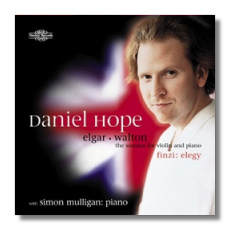
The Internet's Premier Classical Music Source
Related Links
- Latest Reviews
- More Reviews
-
By Composer
-
Collections
DVD & Blu-ray
Books
Concert Reviews
Articles/Interviews
Software
Audio
Search Amazon
Recommended Links
Site News
 CD Review
CD Review
British Violin Sonatas

- Gerald Finzi: Elegy for Violin and Piano
- Edward Elgar: Sonata for Violin and Piano
- William Walton: Violin Sonata
Daniel Hope, violin
Simon Mulligan, piano
Nimbus NI5666
If ever there was a chance for excess in performance, this CD could be it: three of the most intensely effusive violin sonatas ever to emerge from the British Isles.
Gerald Finzi's 1940 Elegy for Violin and Piano keens for the lost pastoral and romantic spirit, both squashed by the encroaching war. (He once wrote an ode called Intimations of Immortality.) Its melancholic first theme engenders images of youths pining for the unobtainable. There is no trace of dissonance; even when the violin wails at its peak – the lament as the war intrudes – the music doesn't smooth its furrowed brow. Its ff strains rave on, but with a sharper sense of urgency. The penultimate melody doesn't depart radically in style from the opening one, but instead dwindles tastefully to its death, like a verismo opera heroine.
As with the Finzi, Hope and Mulligan succeed in coaxing subtlety from Elgar where there is precious little. The opening figures burst into the room like partygoers tipsy from Liebfraumilch. Hope then shows how to twist mood and accent from the many scalar ascents, sometimes shaking them when they require melodrama, other times coaxing them like shy children. This piece, written at the end of World War I, is also a lament, but with more variation to the tonal sobbing.
The musicians are utterly faithful to this music, giving it the melodic expression its calls for (and deserves), but no more. Walton's sonata crosses similar territory but explores higher ground and deeper caverns. Hope plays the variations in II with drama rather than melodrama, molding the adagio segments with lurking tension and the choppy allegros with a loopyness he learned from Schnittke and Weill (NI 5582). We don't hear these rare pieces that often and seldom with such exuberant irony.
Copyright © 2001, Peter Bates


















